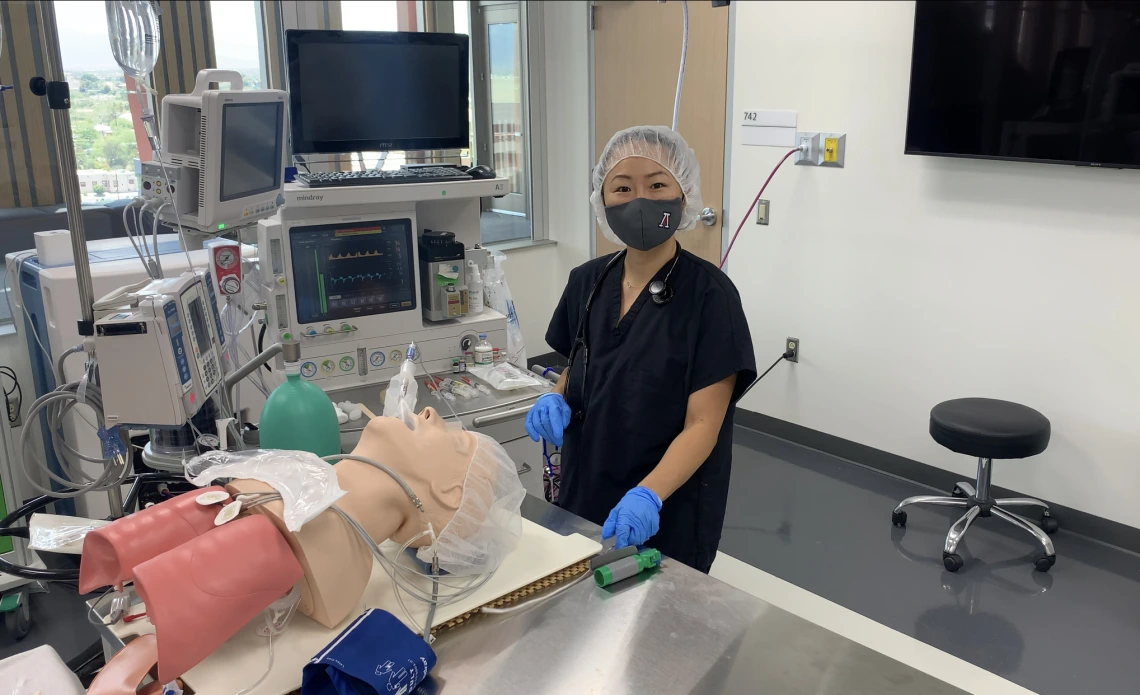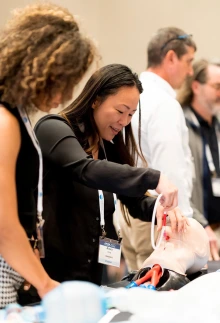Wildcat Nurse Spotlight: Nurse Anesthesia Student Alexa Dang

A first-generation college student from Washington State, Alexa Dang wasn’t sure at first where her academic trajectory would lead her. Lacking resources and mentors, she had to figure out her path on her own. A natural caregiver, she enjoyed helping people from an early age. Friends and loved ones came to her with problems and she always felt like she had something to offer.
Initially, Dang enrolled in a college without a nursing program, but she soon realized that nursing was the career for her. “It took me a long time to figure out navigating college,” she says. “There wasn’t really anyone to inspire me to go into nursing. I didn’t know any nurses, but I knew that I loved caring for people. But when I went into a nursing program, I just fell in love with it. I had found my calling. There are so many options within the field and I’m grateful that I picked he profession.”
“I’ve learned that the wildcat nurse is a nursing professional who recognizes the importance of the value that nurses serve for our community. A wildcat nurse is also someone that practices being open-minded, is aware of the importance of health equity, and has a commitment to lifelong learning," ~ Alexa Dang, UArizona Nurse Anesthesia Student
How did you get started on your nursing career?
Originally, I went to a community college and got my Associates degree in nursing and then transferred back to the University of Washington to earn my RN-BSN bridge degree. From there I worked many jobs in the field. My first job was in wound care at a wound center, where I had some very interesting interactions with different specialties within wound care. It was quite a sick population of patients in an underserved area. After that, I worked in a cardiovascular Intensive Care Unit in Tacoma.
I thought that I had found my calling. I loved the environment, I loved the people I worked with, I loved the challenges of learning about the human body and illnesses and physiology of it. I worked there for six or seven years before I discovered what a CRNA was. Colleagues of mine were applying to programs. After working with recovering open heart patients, I found I really enjoyed the perioperative aspects of caring for patients. I had a great relationship with many of the anesthesiologists and the surgeons that I worked with in the cardiovascular ICU, so I became inspired to seeks a role as a CRNA. I applied to programs with the help of many of my colleagues, some of whom are now CRNAs, and mentors in leadership who also supported me through this journey.
What led you from Washington to Arizona?
I was born in Seattle and didn’t leave there until about 2017. I moved to Chicago for a year and worked in a cardiovascular ICU, where I learned about the regional differences in practice. At that point I was actively seeking to go to CRNA school, exploring the different programs, and interviewing. I thought that I wanted to live in the Midwest but after interviewing at a of couple places I realized that maybe it wasn’t the right fit. So I talked with some of my colleagues who had gone thru the process, finding out what they loved about their program, what kind of support did they have. A lot of people who apply to CRNA school say, ‘I’d take any position if they let me in,’ but I found the biggest connection with the faculty at UArizona Nursing. I really enjoyed the interview process, I felt supported, and the University of Arizona had a great standing as a college, so I decided to pursue my career here.

What’s your favorite features of the UArizona Nurse Anesthesia program?
I started the program right at the height of COVID. My first year was in 2020, so everything was just starting with the pandemic. Our program actually started a month earlier than expected, and there was a lot of concern and fear going on. The initial semester is largely in-person normally, but everything was online at that point. Our anatomy class was online rather than in the lab, so it was hard at first to establish a rapport with my classmates. We’re a very small class of 18, but when we finally met in-person in September, I discovered those relationships were my favorite part of it. My class is incredibly diverse in background and in culture, and we really connected immediately. We all have a passion for learning and being in that sort of environment. It was great having classmates and faculty all on the same page and excited about anesthesia.
What’s does it mean to you to be a Wildcat Nurse?
I’m not originally a Wildcat Nurse but I’ve learned that the wildcat nurse is a nursing professional who recognizes the importance of the value that nurses serve for our community. A wildcat nurse is also someone that practices being open-minded, is aware of the importance of health equity, and has a commitment to lifelong learning. That’s what it means for me.
What are your plans for the future?
After I graduate in May, I will be studying very vigorously for my board’s examination. Hopefully I’ll take that within a month after graduation. After that there’ll be a little bit of a gap of time between when I take boards and when I start working, so I would like to take advantage of spending quality family time with my husband as well as my family back in Washington.
Where would you like to pursue work after graduation?
That’s a big question for me at the moment. I’m based in Phoenix, so I plan to stay here immediately after graduation, probably for two years. Many of my clinical rotations are in Phoenix, I’ve made a lot of connections here with the CRNA community and I feel like this is a great place to start my practice. However, since I’m not originally from Arizona, I may move closer to family back in Washington, or maybe in the middle, Oregon, between Washington and California, where my husband’s family lives.
Do you have any advice for students considering this career?
It sounds cliché but I would say ‘Never give up’ if you truly want to be in this profession and you know it deep down. You may experience failures in applying or interviewing – for example, I’ve had an experience of a terrible interview -- but keep going. Brush it off and learn from the experience. It will be worthwhile.

